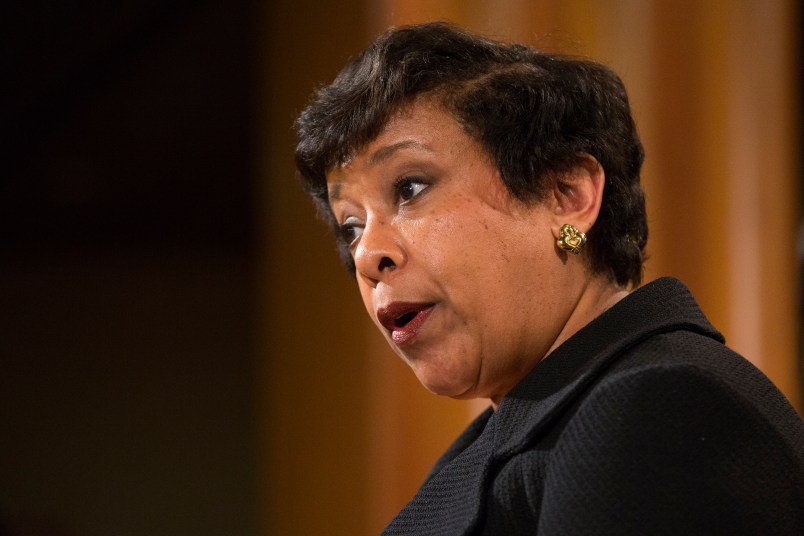The Department of Justice Monday filed a lawsuit challenging North Carolina’s HB2, known as the state’s “bathroom bill.” The complaint alleges that provisions in the law that bars transgender people from using bathrooms of public agency aligned with their gender identity violates various civil rights laws.
In particular the Justice Department is focusing on North Carolina state government as an employer and alleges that enforcement of the law discriminates against transgender state employees.
“This action is about a great deal more than bathrooms,” Attorney General Loretta Lynch said in press conference announcing the lawsuit. “This is about the dignity and the respect that we accord our fellow citizens and the laws we as the people and as a country have enacted to protect them, indeed to protect of all of us.”
The complaint coincides with the deadline the Department of Justice had given North Carolina to confirm “that the State will not comply with or implement HB2,” as the agency said it violates various federal statutes. Not only did Gov. Pat McCrory (R) signal he would not be backing down from enforcing the law, he fired an opening shot Monday morning by filing a legal complaint of his own against the federal government, accusing the Obama administration of a “radical reinterpretation” of civil rights laws.
In Monday’s press conference, Lynch called the legislation “state-sponsored discrimination against transgender individuals, who simply seek to engage in the most private of functions in a place of safety and security – a right taken for granted by most of us.”
Lynch, who is from North Carolina, also compared it to discrimination faced by African Americans.
“It was not so very long ago that states including North Carolina had other signs above restrooms, water fountains and on public accommodations keeping people out based on a distinction without a difference,” she said.
The defendants in the case are McCrory and the State of North Carolina, the University of North Carolina, North Carolina Department of Public Safety and the Board of Governors of the University of North Carolina. The lawsuit alleges their implementation of HB2 “stigmatizes and singles out transgender individuals seeking access to covered facilities, results in their isolation and exclusion, and perpetuates a sense that they are not worthy of equal treatment and respect.” It calls the law a violation of Title VII, which prohibits sex discrimination by employers (among other types of discrimination); of Title IX, which bars sex discrimination in education; and of the Violence Against Women Act.
On Monday, Lynch suggested that in addition to the lawsuit, the DOJ was still considering withholding federal funding for the Department of Public Safety and the University.
Since its passage in March, HB2 has been criticized not just by LGBT rights groups, but also the entertainment world and businesses that have threatened to boycott the state over the legislation. McCrory tried to address the backlash with an executive order that sought to water down some of its provisions. But he has stood by its mandate that public schools at government buildings prohibit transgender people for using bathrooms aligned with their identities, as well as its overruling of local anti-discrimination law.
Its defenders say that the bathroom provision of HB2 is aimed at preventing predators from attacking women in bathrooms, though they have struggled to connect those crimes with these laws. Lynch alluded to “human fear of the unknown and a discomfort with the uncertainty of change,” but said that in response Americans must “summon our national virtues of inclusivity, of diversity, of compassion and open mindedness.”
“This is why none of us can stand by when a state enters the business of legislating identity and insists that a person pretend to be something or someone that they are not, or invents a problem that does not exist as a pretext for discrimination and harassment,” she said. “What this law does is inflict further indignity on a population that has already suffered far more than its fair share. This provides no benefit to society and all it does is harm innocent Americans.”
Read the complaint below:







Game on!
Laissez les bons temps roulez.
Is this filed in the same court as NC’s declaratory judgment? Or is the first fight about which judge hears what?
Cases are randomly assigned. Might, or might not, be assigned to the same court. The judges (if different judges are hearing the 2 cases) could decide to combine the cases.
No, I mean is it even the same federal court district? NC Middle, NC Eastern?